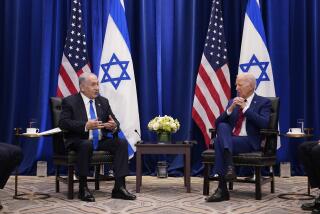Shamir Talks With Reagan, Applauds U.S. Gulf Escorts
- Share via
WASHINGTON — Israeli Prime Minister Yitzhak Shamir denounced Iran and Iraq as “extreme enemies of our country” Friday, and applauded the United States for protecting Kuwaiti ships in the Persian Gulf. He said that the escort operation should strengthen U.S. credibility in the Arab world and enhance the American position as a mediator in the Middle East.
“I congratulated (President Reagan) on the great American success in the Persian Gulf,” Shamir said after a White House meeting with the President and Secretary of State George P. Shultz.
Shamir said that the U.S. naval presence in the gulf demonstrates to Jordan, Saudi Arabia, Kuwait and other Arab states that when their security and stability are on the line “they have to rely . . . only on the United States.”
Later, in a speech, Shamir made it clear that his concern for Arab security is not purely altruistic when he said the United States is the only country he would accept as a mediator between Israel and its Arab neighbors. Therefore, he said, it is important for Washington to refurbish its credibility with the Arabs, who want to substitute an international conference for the usual U.S. role of go-between.
Shamir said that an international conference attended by the five permanent members of the U.N. Security Council as well as Israel and its Arab adversaries would be a step backward.
King Hussein of Jordan has said that he is prepared to negotiate with Israel at such a conference, but not under other circumstances. Although Shamir and his Likud Bloc oppose the conference idea, it is supported by Foreign Minister Shimon Peres, leader of the Labor Alignment, which shares power with the Likud in Israel’s “national unity” government.
Shamir indicated that he is prepared to wait out both Hussein and Peres.
“We think that when it will become clear that the option of an international conference is not realistic and it doesn’t exist, our neighbors will accept the way of direct negotiations,” he said.
In the meantime, Shamir emphasized that he will maintain the hard-line stance. He offered no inducement to bring Hussein or other Arab parties to the negotiating table. On the contrary, he rejected the territory-for-peace formula recommended in U.N. Security Council Resolution 242 and said that Israel should not be expected to withdraw from the West Bank of the Jordan River and Gaza Strip territories that it seized in the 1967 war and has occupied ever since.
No ‘Territorial Compromise’
“I don’t believe territorial compromise is a realistic solution for the conflict between us and the Arabs,” Shamir said. “Therefore, we have to look for other ways to make peace through other compromises, and I think there are such ways. If we will come to direct negotiations . . . we will find such solutions.”
Shamir’s visit was described as a private one. When it was first announced, the White House said that Reagan would be unable to find time to meet him. Following an outcry from Israel and its American allies, however, the President invited Shamir to the White House.
Before he left Israel this week, Shamir said in an interview with the New York Times that he had no regrets about Israel’s channeling of U.S. weapons to Iran in what later became known as the Iran-Contra scandal. He said the Israeli government is no longer supplying arms to Iran, but that he could not be sure what private Israeli arms merchants are doing.
A senior Administration official said Shamir told Reagan, however, that selling weapons to Iran is “against government policy and there’s no ongoing traffic.” Shamir said that as far as the Israeli government could tell, Israeli arms merchants no longer are doing business with Iran, according to the official.
Shamir did not mention Israeli arms shipments to Iran in his public appearances, but he took a stance of impartial opposition to both combatants in the Iran-Iraq war.
“Iran and Iraq, both of them are extreme enemies of our country,” he said. “We don’t see any reason to help one or the other.”
More to Read
Sign up for Essential California
The most important California stories and recommendations in your inbox every morning.
You may occasionally receive promotional content from the Los Angeles Times.













